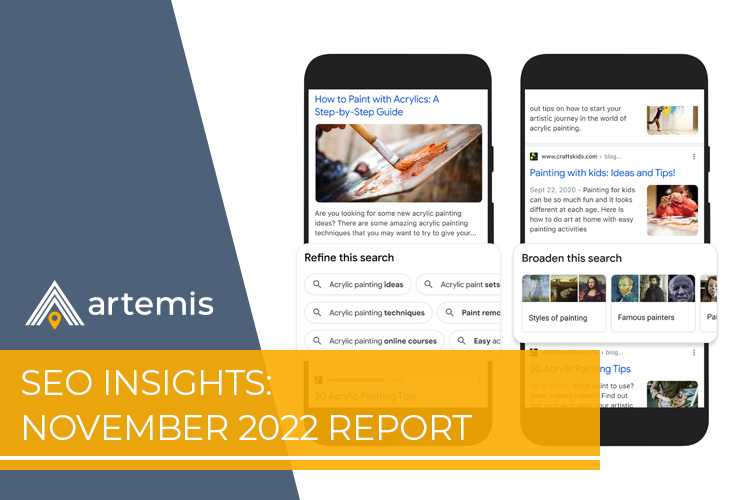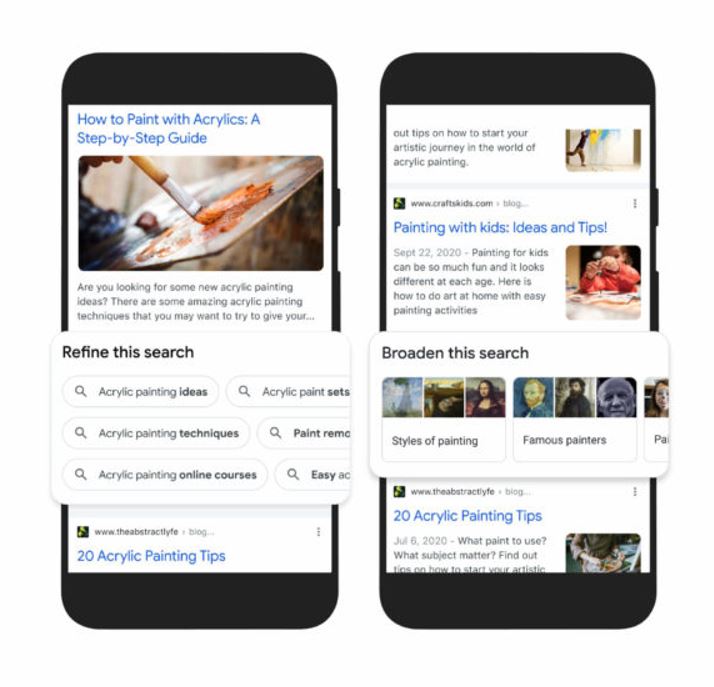SEO Insights: November 2022 Report

Is Google search getting worse? Are the results not as good as they should be, or possibly, worse than before?
This is a discussion which has been doing the rounds recently and it has been brought on by a couple of sources.
A recent study by SEMRush found that “almost 30% of people are either refining or extending their queries in some way”. This is potentially highlighting the problem that the results are simply not good enough based on the user’s initial search query. Users are finding that they are having to search again to find the results that they are looking for.
In fact, Google has even recently introduced new “refine this search” and “broaden this search” as additional options in the search results:

Is Google seeing that users are sometimes struggling to find what they are looking for, or are users simply interacting with the vast number of query refinement options and additional features in the search results?
Either way, something appears broken here.
Is the Internet the problem?
Perhaps the problem is not Google, but instead the problem is that the Internet, which is unregulated, has exponentially expanded since its inception and with it has deteriorated in terms of the quality of the content available to index by search engines.
This is what Marissa Mayer, ex-Googler and ex-CEO of Yahoo, stated in a recent podcast.
“I do think the quality of the Internet has taken a hit. When I started at Google, there were about 30 million web pages, so crawling them all and indexing them all was relatively straightforward. It sounds like a lot, but it’s small. Today, I think there was one point where Google had seen more than a trillion URLs.”
Marissa’s argument is that Google is just a view of the web and that the real question is, why is the web getting worse?
There are many reasons that can be attributed to the web getting worse, but primarily it’s because there is an economic incentive for the publication of content, for traffic and sales. With potential high financial rewards from high traffic, this has led to a plethora of users around the world creating huge amounts of content with a view to attaining high search engine rankings which is then beneficially monetised.
The Internet is getting flooded with low-quality “made for SEO” content.
This problem is potentially only getting worse with time.
Marissa also suggested in the podcast that the reason for Google displaying “Featured snippets”, which appear at the top of the search results and answer the question the user is searching for, is because Google may be hesitant to send users to websites.
“I think that Google is more hesitant to send users out into the web. And to me, you know, that points to a natural tension where they’re saying, ‘Wait, we see that the web sometimes isn’t a great experience for our searchers to continue onto. We’re keeping them on our page.’”
The internet has changed and evolved considerably over the years, and maybe this is just one of the ways that Google is tackling the issue of low-quality content and websites.
Are the Google updates helping?
The rate and frequency of known Google algorithm updates has certainly increased in recent years, and this reflects the enormous effort now required to ensure that the search results remain relevant, useful and spam-free…although they don’t always work as desired.
Spam updates, core updates, helpful content updates, product review updates; these are all on the official list of updates for 2022. Some have proved to be quite significant, such as the core updates, which are aimed at improving the overall quality and relevance of the search results.
The Helpful Content Update, released in August, didn’t appear to have much of an impact on the search results, but it’s expected to have an increased effect over time. It’s designed to continuously learn and improve. It’s likely that one of the areas that it will be focused on is AI (artificial intelligence) generated content, which is fast becoming the new headache for Google.
AI generated content, without editorial input, is not yet of a high enough quality that it should merit a place in the search results.
In a recent Google Office Hours video, Google search quality engineer, Duy Nguyen, was asked about the use of AI to plagiarise content, modify it and outrank other sites in the search results.
“Google has many algorithms to go after such behaviours and demote sites scraping content from other sites.”
However, there is still a long way to go before Google is truly able to detect content that has been generated using AI. Even during the latest spam updates, many websites with AI content were still ranking fine.
It’s only a matter of time, but we can expect some updates soon as Google continues to better understand and get on top of this new problem.
Let’s not add to the problem
Unfortunately, there is too much poor-quality content and poor user experiences on the web today, and the problem is only getting worse. Google, and other search engines, will have to continuously adapt their algorithms to fight increased spam and new threats to the search results such as AI generated content.
There is only one way to stand out above this noise and that’s by focusing on the user, having great quality editorial content and a clean link profile. As Google tackles all forms of web spam, the fundamentals of a good website should always prevail.
At Artemis, we have always believed in ensuring our clients’ websites continue to work for them over the long term. We don’t take short-cuts, we don’t use “quick wins” and we don’t do spam. Our focus is, and has always been, on making Google’s job easier. We provide a great reason to Google to rank our clients’ website through great content and high-quality natural backlinks.
We don’t want to be a part of the headache!

